When we think of the future of football, it’s easy to picture robotic referees or flying cameras hovering above the pitch. But the future isn’t some distant concept — it’s already here, subtly and not-so-subtly reshaping how football is played, coached, watched, and even bet on.
Football, long celebrated for its tradition and simplicity, is now one of the most tech-influenced sports in the world. And while some purists may resist the changes, the truth is clear: technology isn’t killing the soul of the game it’s expanding its possibilities.
Let’s take a closer look at the innovations that are rewriting the rules, both on and off the pitch.
From Boots to Algorithms: Where the Game is Evolving
Footballers train differently, coaches think differently, and fans engage differently. Here’s how:
1. Wearable Technology
From GPS vests to heart rate trackers, players today are basically mobile data hubs. Coaches can monitor sprint speed, fatigue levels, and even hydration in real time. These numbers now influence tactical decisions, substitutions, and individual training regimens.
2. VAR & Semi-Automated Offside Detection
While VAR still sparks controversy, it has made the game more transparent (and yes, occasionally more chaotic). The addition of semi-automated offside systems using sensors in the ball and player tracking now reduces human error and tightens decision-making.
3. Smart Balls
Yes, the ball itself is now smart. FIFA has introduced footballs embedded with microchips that track speed, spin, and point of contact. This not only improves officiating but also provides new layers of data for analysis.
4. Tactical Analysis Powered by AI
Gone are the days of chalkboards. AI platforms now break down thousands of in-game events to reveal patterns invisible to the naked eye. Coaches use these insights to prepare counter-strategies, scout opponents, and build personalized tactical frameworks.
5. Virtual Reality (VR) Training
Some clubs are already using VR to simulate match scenarios for players recovering from injury or to mentally prepare young talent for high-pressure games. It’s not just about physical training anymore — it’s mental immersion.

It’s Not Just for Players Anymore
One of the most fascinating shifts? These technologies aren’t just for teams. They’re also shaping how fans experience the game especially those who engage with betting.
With real-time data streams, predictive analytics, and live metrics available through apps and platforms, punters are no longer guessing. They’re betting based on heatmaps, xG trends, and even AI-generated match projections. The edge doesn’t belong only to the bookmakers anymore smart bettors are using tech to close the gap.
And as micro-betting (e.g., betting on the outcome of the next throw-in or corner) continues to grow, this live data is not just useful — it’s essential.
What’s Gained, What’s Lost?
There’s a quiet debate in the background of every technological leap: Are we losing the human element?
Some argue that over-reliance on data reduces intuition and spontaneity. That decisions become sterile, and football too “calculated.” But most professionals see it differently. The best teams don’t ignore human instinct they enhance it with better information.
It’s not man vs. machine. It’s man and machine.
A Glimpse at What’s Next
If current trends hold, here are a few technologies likely to expand in the next 3–5 years:
-
AI-driven scouting platforms that discover talent in lower leagues before scouts do
-
Brainwave monitoring to measure player focus and decision-making during games
-
Augmented reality stadiums where fans can access live stats and alternative camera angles via AR glasses
-
Personalized fan experiences powered by blockchain tickets, replays, loyalty, all synced
Football is becoming a laboratory of innovation, and unlike many industries, fans aren’t being left out they’re being brought in.
The future of football isn’t something to wait for it’s already influencing the decisions made in every match you watch this weekend. From the GPS in a midfielder’s vest to the chip in the match ball, the beautiful game has never been more connected.
And for those who bet, cheer, coach, or simply obsess over every pass, knowing how these technologies work isn’t just interesting it’s becoming part of understanding the game itself.





